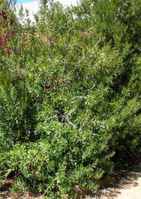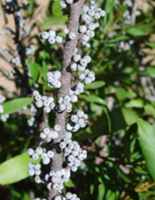MYRICA
MYRICA
(Plant heights are given at maturity)
Myricas are hardy shrubs grown primarily for their ornamental
value,
members of the family Myricaceae. Varieties are native
to areas
across the northern hemisphere. They have a rounded growth habit,
leathery leaves and bear berries, sometimes blue or
red, which are used
for a variety of applications. The shrubs are nitrogen fixing,
adding
nitrogen to the soil. They make excellent
border, specimen
or landscaping plants as well as herbs.
Most Myricas prefer a slightly acidic soils, but M. pennsylvanica
does
well in heavy clay. They thrive in full sun, although a partially
shaded location with 6-7
hours a day of sunlight will work.
Propagation is easily done by sowing seed, taking cuttings,
layering or
air layering. The seeds are coated with a natural wax which is
best removed prior to sowing. This can be done by scarifying the
seed (see Hot Water Scarification below). Stored seed
should also
be cold stratified for 90 days beofre sowing for best
germination. See Cold Stratification Tips.
Softwood
cuttings
should
be taken late summer or early fall and
inserted into packed sand and peat, which should then be kept moist
until rooting.
The wax on Myrica berries is very fragrant and is used
frequently to
manufacture candles. Herbal uses are listed below by
variety.
Myrica cerifera (Cerothamnus caroliniensis) Bayberry
(Wax Myrtle,
Candleberry, Tallow shrub, Wasnagel, Mirika,
Myrtle)

 A medium sized deciduous
shrub
with fragrant blooms, maturing into blue
berries, and small oval leaves. Good for use as a hedge
or
landscape
shrub, it can tolerate windy areas in dappled shade. The berries
and leaves are edible and are used as a substitute
for bay leaves, or
made
into a fragrant tea. Medicinally, the bark is
used to increase
circulation
and as an antibacterial in the treatment of colds, flu,
jaundice,
fever,
sore throat and dandruff. The waxy coating on
the seeds is used
in
the making of candles. Hardy to -10F (-23.3C); Full sun
or
partial
shade; height: 10ft.
A medium sized deciduous
shrub
with fragrant blooms, maturing into blue
berries, and small oval leaves. Good for use as a hedge
or
landscape
shrub, it can tolerate windy areas in dappled shade. The berries
and leaves are edible and are used as a substitute
for bay leaves, or
made
into a fragrant tea. Medicinally, the bark is
used to increase
circulation
and as an antibacterial in the treatment of colds, flu,
jaundice,
fever,
sore throat and dandruff. The waxy coating on
the seeds is used
in
the making of candles. Hardy to -10F (-23.3C); Full sun
or
partial
shade; height: 10ft.
| #2063 Packet $15.50
Approximately 50 seeds |
|
| #Bz-2063 1 oz. seeds $50.50 |
|
| #B1-2063 1 lb. seeds $199.99 |
|
| #P2063 1 yr. Plant
$34.99 |
|
| #P3-2063 (1 yr. plants) Three
plants for $50.99 |
|
| #P12-2063 (1 yr. plants) Twelve
plants for $149.99 |
|
Myrica pennsylvanica (M. carolinensis)
Northern Bayberry
Extremely hardy variety, native to North America and well
adapted to
poor dry soil in exposed locations. Although deciduous, the
aromatic leaves usually remain on the shrub well into the
winter.
Fruits are covered in greyish wax used to make candles
and hang on
throughout the winter. The shrubs spread by means of suckers and
can form hedges. This variety also stands salt spray very
well and does well in poor sandy soilsl. Medicinally,
the
roots of this type are emetic. Plants reach maturity in 5 to
7 years.
Height: 10ft Spread: 10ft. Hardy to -40F (-40C)
#3306 Packet $25.50
Approximately 50 seeds
|
|
| #Bz-3306 1 oz. seeds $34.50 |
|
| #B4z-3306 4 oz. seeds $88.50 |
|
| #B1-3306 1 lb. seeds $176.50 |
|
Myrica rubra - Chinese bayberry (yangmei,
Yamamomo, Yum Berry)
Native of China and Japan, this hardy shrub grows to about 15ft in
height and is evergreen. The berries on this variety
are red and
are edible, cooked or raw, but do not
last long. Medicinally, the
berries are used to treat skin ailments and wounds,
and in the
treatment of heart ailments and cholera. A yellow
dye is
extracted from the bark. Good landscape plant.
Height: 15ft Spread: 15ft. Hardy to 20F (-12.2C)
| #2064 Packet $25.50
Approximately 50 seeds |
|
| #Bz-2064 1 oz. seeds $38.50 |
|
| #B1-2064 1 lb. seeds $159.50 |
|
TIP: SEED - HOT WATER SCARIFICATION
involves placing seeds in water that is 170 to 210 degrees F. not
boiling. After the water cools, seeds should continue to soak for 12 to
24 hours. Use 10-20 times the volume of hot water as seed. Seeds with a
waxy coating, such as myrica, should be washed
several times in very hot water to remove the wax before the final
soaking.
see also: NATURAL SCARIFICATION, MECHANICAL SCARIFICATION, ACID SCARIFICATION
|
ORDER EARLY!
See TERMS
Back to VARIETY INDEX Terms
HOME
 If
you have arrived in someone else's frame, or can not see all of the
other
information available on richfarmgarden.com Click on logo to enter from
beginning
If
you have arrived in someone else's frame, or can not see all of the
other
information available on richfarmgarden.com Click on logo to enter from
beginning

 A medium sized deciduous
shrub
with fragrant blooms, maturing into blue
berries, and small oval leaves. Good for use as a hedge
or
landscape
shrub, it can tolerate windy areas in dappled shade. The berries
and leaves are edible and are used as a substitute
for bay leaves, or
made
into a fragrant tea. Medicinally, the bark is
used to increase
circulation
and as an antibacterial in the treatment of colds, flu,
jaundice,
fever,
sore throat and dandruff. The waxy coating on
the seeds is used
in
the making of candles. Hardy to -10F (-23.3C); Full sun
or
partial
shade; height: 10ft.
A medium sized deciduous
shrub
with fragrant blooms, maturing into blue
berries, and small oval leaves. Good for use as a hedge
or
landscape
shrub, it can tolerate windy areas in dappled shade. The berries
and leaves are edible and are used as a substitute
for bay leaves, or
made
into a fragrant tea. Medicinally, the bark is
used to increase
circulation
and as an antibacterial in the treatment of colds, flu,
jaundice,
fever,
sore throat and dandruff. The waxy coating on
the seeds is used
in
the making of candles. Hardy to -10F (-23.3C); Full sun
or
partial
shade; height: 10ft.